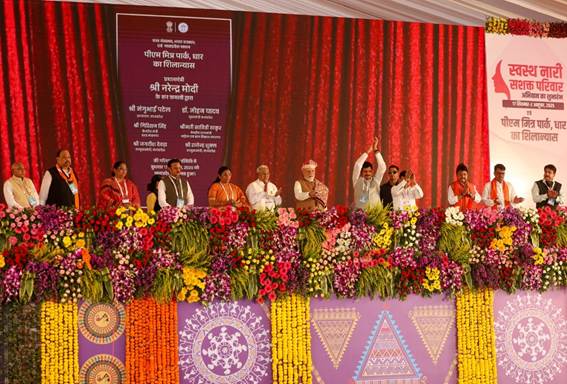SwasthNari, SashaktParivarAbhiyaan

- 22 Sep 2025
In News:
Recently, Prime Minister Narendra Modi launched the ‘SwasthNari, SashaktParivar (SNSP) Abhiyaan’ and the 8thRashtriyaPoshanMaah from Dhar, Madhya Pradesh, marking one of India’s largest-ever health outreach campaigns for women and children. The initiative reflects the government’s commitment to promoting women-led development and holistic family well-being through accessible and equitable healthcare.
About the SwasthNari, SashaktParivarAbhiyaan
- The SNSP Abhiyaan is a joint initiative of the Ministry of Health & Family Welfare (MoHFW) and the Ministry of Women & Child Development (MoWCD).
- It aims to provide preventive, promotive, and curative health services to women and children, particularly in underserved regions.
- The campaign will organize over 10 lakh health camps between 17th September and 2nd October 2025 at Ayushman Arogya Mandirs, Community Health Centres (CHCs), District Hospitals, and other public health facilities across the country.
- This mass mobilisation aligns with the broader vision of Viksit Bharat (Developed India), where “Nari Shakti” (women power) forms the foundation of national progress.
Key Objectives
- Enhance Women’s Health through Screening and Care:Regular health check-ups for women, focusing on non-communicable diseases (NCDs) such as hypertension, diabetes, cancer, anaemia, tuberculosis, and sickle cell disease.
- Promote Maternal and Child Well-being:Strengthening antenatal care, immunisation, nutrition counselling, menstrual hygiene awareness, and adolescent health initiatives.
- Foster Behavioural Change and Health Education:Conducting awareness drives on healthy lifestyle practices, mental health, obesity prevention, and voluntary blood donation.
- Encourage Community Participation:Mobilisation through ASHAs, ANMs, Anganwadi workers, Self-Help Groups (SHGs), Panchayati Raj Institutions (PRIs), MY Bharat volunteers, and youth networks.
- Integrate Digital and Media Outreach:Real-time monitoring through the SASHAKT Portal, along with mass awareness via Doordarshan, All India Radio (AIR), and social media platforms.
Implementation Framework
- Nationwide Health Camps:Health facilities at all levels — from Ayushman Arogya Mandirs to tertiary hospitals — will provide free diagnostic tests, medicines, and specialist consultations.
- Specialist Services:Departments such as Gynaecology, Paediatrics, Ophthalmology, ENT, Dental, Dermatology, and Psychiatry will extend services through AIIMS, ESIC hospitals, Railway and Defence hospitals, and Institutes of National Importance (INIs).
- Public–Private Collaboration:Private hospitals and medical institutions have been encouraged to contribute to the outreach, ensuring broader reach and continuity of care.
- Community Health Monitoring:Volunteer initiatives like Nikshay Mitra will support tuberculosis prevention, while local youth networks promote healthy practices at the grassroots level.
Focus on Sickle Cell Anaemia
- During the launch, the Prime Minister handed over the 1 croreth Sickle Cell Card, underscoring the government’s National Sickle Cell Anaemia Mission. Over 5 crore individuals have been screened so far, especially in tribal-dominated regions, where the disease burden is highest. The mission aims at eliminating Sickle Cell Anaemia by 2047, ensuring improved tribal health outcomes.
Institutional and Grassroots Coordination
- Chief Ministers, Governors, Union Ministers, and local representatives across states participated in the launch events simultaneously. Ground-level implementation is being led by health workers, SHGs, PRIs, and community volunteers, ensuring last-mile outreach and inclusive participation.
Significance
- Largest Health Outreach in India: Over 10 lakh health camps make it the widest public health drive for women and children.
- Women-Centric Development: Strengthens India’s shift toward women-led welfare models under the vision of Viksit Bharat.
- Integrated Governance Model: Combines health, nutrition, and social empowerment across multiple ministries.
- Public Health Transformation: Promotes preventive healthcare, early detection, and equitable access to medical services.
- Focus on Tribal and Rural Health: Addresses critical health challenges in vulnerable and remote regions.
